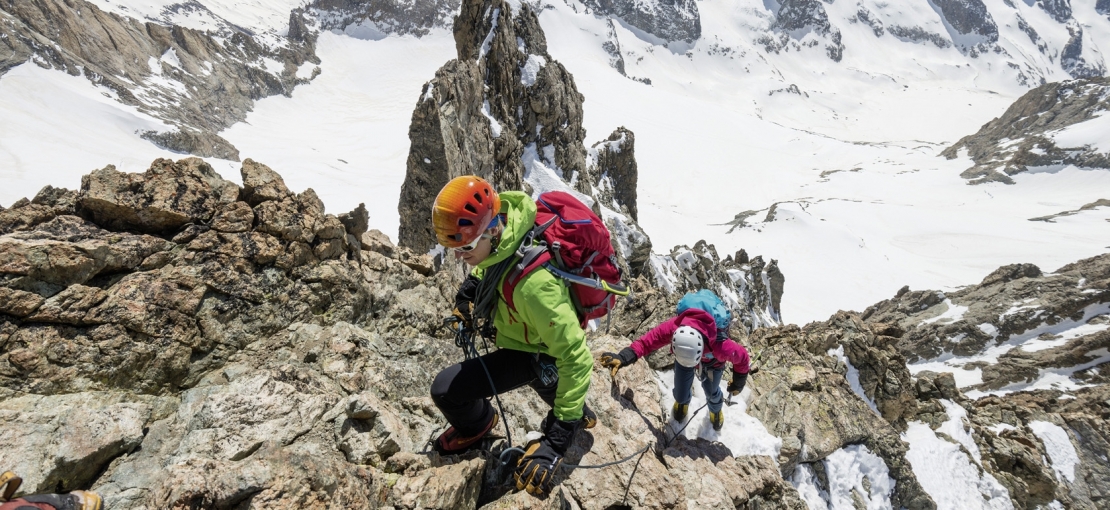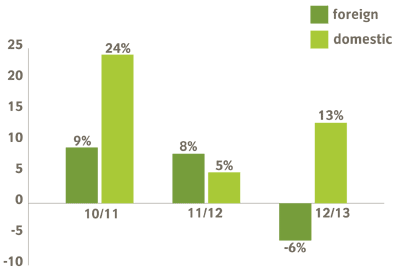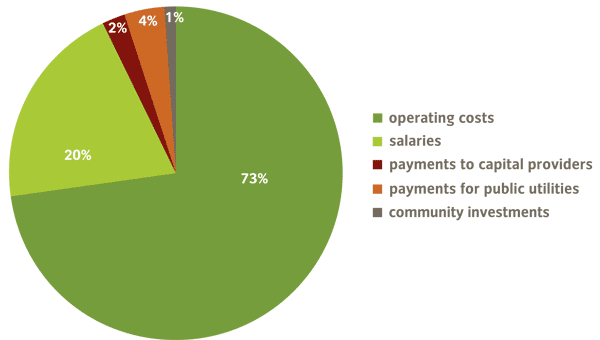
Sustainable business is worthwhile
Strong turnover growth with eco-friendly products
As a sustainable family business, we at VAUDE have a special responsibility towards people and nature. At the center of our work is our aim to manage the company as sustainably as possible. Our goal is to create a safe and attractive workplace for our employees and to sustain VAUDE across generations.
Our sustainable claim is not inconsistent with economic growth. There are several reasons and goals:
- Financial independence: The intergenerational preservation of the family business is our ultimate goal.
- International competitiveness: The competition in the outdoor industry is extremely dynamic, international and has been determined by acquisitions and debt for the past few years. The size of the company and its associated brand strength are relevant to success in this competition, an important goal for us.
- Efficient economics: Further growth is necessary in order to efficiently do business in the three main business areas of our corporate structure, and allows for more efficient production using economies of scale.
- More influence for sustainability: Growth also helps us to have more influence on production and material suppliers, and facilitates us in taking further steps in sustainability.
| GRI: | EC 1 |
| GRI: | G4-9 |
| GRI: | DMA Economic Performance |
Our values are based on the idea that sustainability does not preclude successful business, and are not aligned with pure profit maximization. We are convinced: sustainable management pays off in the long term.
We are also willing to invest in this concept: in 2013, we invested 504,640 Euros - see also "Environmental management system".
»We believe that sustainable business pays off in the long term. Economic, ecological and social aspects must be equally considered.«
Isabel Stiefenhofer, Controlling at VAUDE
Revenues growing at above-average rates
VAUDE is not subject to disclosure requirements. For competitive reasons, we have chosen not to publish any figures on economic performance. The sales performance of the 2013 fiscal year saw an increase of 7.3 percent in gross revenue compared to the previous year.
This shows that in a stagnating market, VAUDE is growing at above average rates. According to estimates based on data from industry-specific associations, the German outdoor market had a growth rate of just one percent in 2013; in 2012 it was two percent.
Growth rate VAUDE
Improving cost structures
We attained good revenues and cost structures improved in previous years as well. This allowed us, for example, to increase our inventory turnover by 43.8 percent in 2013 .
"As a Sparkassen Finance Group, we have been accompanying VAUDE on their road to success for decades. In our eyes, VAUDE is an outstanding example of how, as a family-owned company, you can successfully and symbiotically harmonize both environmental and social values with business objectives. This is balanced sustainability."
Thomas Kind, Director, Head of Department, Corporate Finance Center for Sparkassen, Landesbank Baden-Württemberg
Cost Structure 2013 in percent
All covenants met or exceeded
Key stakeholders for VAUDE are the banks. VAUDE’s financing options are based on their ratings. As part of our bank financing, we undertake to comply with covenant requirements. These include figures such as equity ratio, interest coverage and debt. In 2013, we were able to meet all requirements and even exceed some of them.
Equity ratio improved between 2012 and 2013
Our equity ratio, including equity-like agents, was 36.4 percent on 31.12.2013. The share of liabilities on the balance sheet as of 31.12.13 was 73.8 percent.
The equity ratio improved by 15.4 percent compared to the previous year. Liabilities were reduced by 12.9 percent on 31.12.13 compared to the previous year.
VAUDE profit participation certificates as a possible future option
In addition, we regularly collect financial figures, which are used to operationally guide the company. The most important figures are reconciled, evaluated and analyzed for deviations from the planned system on a monthly basis by management and controlling division. This is a requisite for the management to identify trends and developments and, when necessary, guide measures to offset adverse developments and reinforce positive trends.
Objective system and budget planning at VAUDE
At VAUDE, the company is guided by a system of objectives and budget planning process. The objective system is arranged according to the perspectives of the "Balanced Scorecard". Measures and indicators are defined for each goal.
In a multi-step process, the achievement of objectives and status of the budget and economics planning is monitored.
- Senior Management executive session in January: management analyzes economic performance in the product areas, analyzes risks within and outside the company as well as the competition, checks the validity of the objectives set and sets strategic guidelines for the next three years.
- Division manager committee executive session in February. The Division Managers define measures for the objectives set for the following year and check the previous achievement levels.
- The set objectives, measures and indicators are broken down by departments.
- The goal achievement levels are checked several times a year. The review indicators for some key figures only take place at the end of the year.
- The budget planning process is closely connected with the corporate management and runs parallel to the goal process. Budget planning takes place in the first half year, including the budget for the following year’s objectives. In several rounds of voting, plans are adapted to the possibilities.
- In a two-day meeting in September, both the objectives for the following year and the budget are finalized by department heads.
- The final, 100 percent approval of the budget in each case comes into effect only after ascertaining the previous year’s results and the winter preorders. If the planned annual results are unlikely to be met on this basis, those responsible can only have 80 percent of their budget.
- Budget compliance is verified during the year.
- Sales are carefully planned and consolidated at the top level.
In addition, we regularly collect financial figures, which are used to operationally guide the company. The most important figures are reconciled, evaluated and analyzed for deviations from the planned system on a monthly basis by management and controlling division. This is a requisite for the management to identify trends and developments and, when necessary, guide measures to offset adverse developments and reinforce positive trends.
Stock reduced by a quarter
With strong planning deviations, for example, budget freezes are imposed. In 2012, to better coordinate complex processes to each other, a supply chain panel was established across departments to analyze the stock situation with all upstream and downstream processes. The measures that the committee defined made it possible to reduce our inventory by 25.68 percent in 2013.






